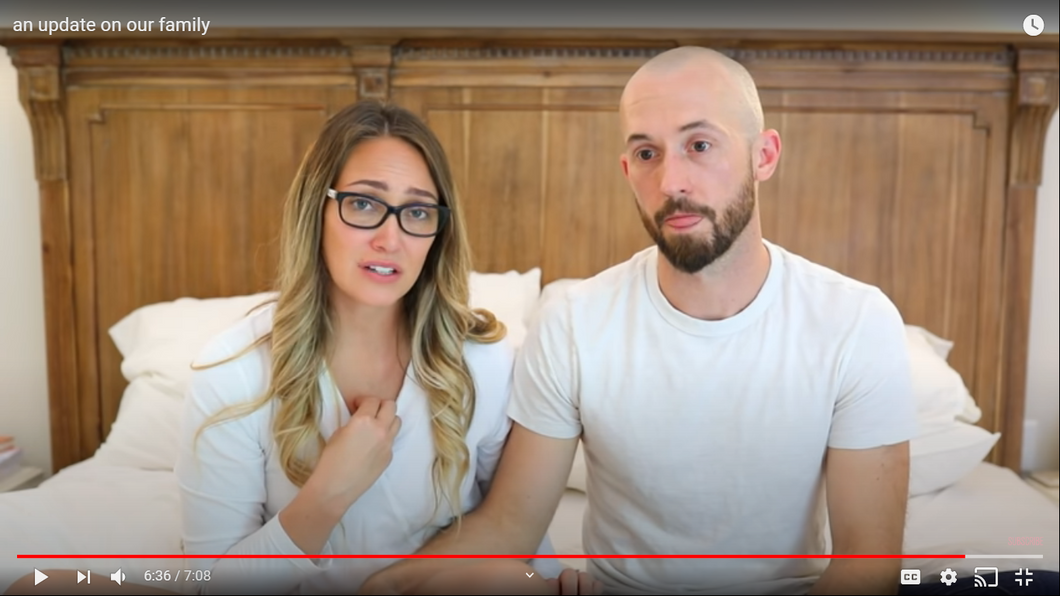Let's dive into some context first: Myka Stauffer, a popular youtube vlogger, was dragged all over the media this past week for "rehoming" her four-year-old adopted son. Stauffer and her husband adopted their son Huxley from china when he was just a 2-and-a-half-year-old toddler, knowing full well of his developmental struggles. Like most mommy vloggers, Stauffer featured her young, adopted son on her channel where she made videos about his challenges with Autism Spectrum Disorder (for monetization, might I add). But, things took a turn for the worst when Myka Stauffer posted on her YouTube a video titled " an update on our family," that detailed how her son's disability was just too much to bear - causing her to "rehome" him.
Of course, this led to much outrage from her fans and extensive coverage on this story by news sites like Buzzfeed, The New York Post, and The NY Daily News. Myka Stauffer was the typical vlogger mommy who uploaded to YouTube videos about her daily routine with her kids ( there are four in total - including Huxley) and some sponsored by Fabletics workout content; so it was a big shock to subscribers that she would "rehome" one of her children.
Apparently, the couple knew Huxley was a child requiring much special care, but they decided to adopt him in 2017 regardless. After this adoption, Myka proceeded to upload sponsored videos about her son's adoption - which are unsurprisingly private now. But according to Stauffer, they didn't know the severity of his special needs. So, after consulting with medical specialists, they determined that Huxley needed to be with a family that could better meet his needs - thus, "rehoming" him.
Naturally, after posting a seven-minute video explaining why they "rehomed" their adopted son, many people attacked the couple with comments like "Had it been your blood you wouldn't have given him away to a "new mommy" that has professional training," and " Some people just aren't meant to adopt. When you adopt you are committed to the child regardless of their needs, struggles, etc. You treat adopted children as your biological."
To be honest, I am really on the fence about this issue. I can understand giving up a child you just don't have the means to care for (whether mentally, physically, or financially), especially if their needs progressively worsen - leaving it impossible for you to care for them. BUT, I don't really appreciate a couple adopting a child, using him for views and sponsorships, then "rehoming" him after two years of him being a part of their family. Something seems very opportunistic about that to me; like Huxley was just a commodity. However, I can also sympathize with the Staffers, from the standpoint that this instance might be exhausting what they have to offer as parents. Yet, that's what parenting is about - loving and caring for your child no matter the circumstance. This is a very messy situation, and I don't think there is no "right" or "wrong" way to view it.
Nevertheless, I don't agree with the term "rehoming" to describe what the Stauffers did with Huxley. "Rehoming" should be reserved for people that adopt a child and realize immediately or shortly after adoption that the child would be better cared for elsewhere. After two years - two birthdays, two Christmases, two years of memories - with a child, you have officially lost the right to say you are "rehoming" him. This little boy, Huxley, was given away because it got too rough for them to handle. However, as I'm only on the outside looking in, I would like to assume the Stauffers are just a lovely couple that realized they were way in over their heads - albeit, they did so a bit too late.
Therefore, in this case, I feel the word, "rehoming" is comparable to the likes of "conscious uncoupling." Meaning, both are merely ways to distort and better reality. You might remember that actress Gwyneth Paltrow used the term "conscious uncoupling" to describe her 2014 divorce to her now ex-husband, Coldplay lead singer, Chris Martin. In a way, Paltrow definitely brought back the term that's been around since the early 1940s and all about using your divorce as a learning experience. However, much like the "rehoming" of Huxley, "conscious uncoupling" is just an optimistic way to look at the disaster. In the first case, a child was taken away from the only home, the only family he had ever know; in the latter, a husband and wife broke a promise that was intended to be lifelong. With all of this in mind, my suggestion is that we'll all just be honest with ourselves in the future.
*Note: Comments above have only been tailored for grammatical clarification.





































